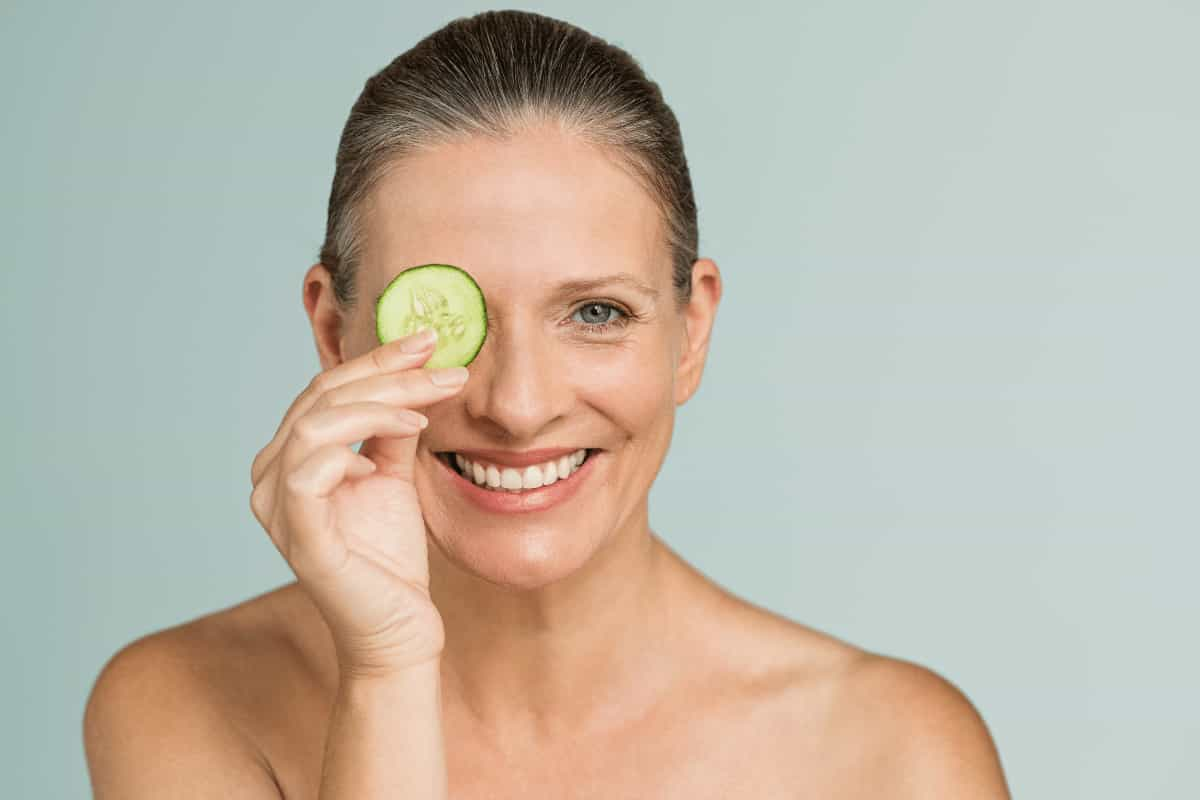6 Secrets to More Youthful Skin

The menopause transition changes a lot—including your skin. Dry skin, fine lines, wrinkles, age spots, acne, and eczema all start to become common complaints around midlife.
Instead of buying yet another $100 serum and crossing your fingers, start with these fundamentals for healthy, mature skin that don’t come in a bottle.
1. Quit smoking
Quitting smoking is one of the single best actions that you can take for your health, including that of your skin. Smoking accelerates the aging process, making skin thinner and less elastic—the recipe for wrinkles.
2. Moisturize
After gently cleansing in the morning and evening (and after sweating), always apply moisturizer.
3. Sunscreen
When it comes to keeping your skin healthy, sunscreen is close to being a miracle product. Apply it every day after your moisturizer, no matter the season or your plans to be inside or outdoors.
Sunscreen protects against “photoaging,” the process where the skin becomes thinner, less elastic, loses collagen and is more likely to have cancerous mutations. An estimated 80% of skin aging on the face can be attributed to UV exposure from the sun.
Wearing sunscreen is the most important step for skin cancer prevention and anti-aging for everyone, even people with darker skin tones. While having more melanin (skin pigment) can provide some UV protection, it doesn’t prevent skin cancer or the effects of aging.
Look for mineral sunscreens with an SPF of 30 or higher that are made with zinc oxide and titanium dioxide. You can avoid the slight white cast of these products by looking for tinted versions.
These “physical” sunscreens are different than the “chemical” sunscreens made with ingredients that may irritate the skin on your face. While there is no conclusive evidence, some research shows that the ingredients in chemical sunscreens can have negative health effects.
4. Less is more
It’s tempting to do more when your skin stops behaving the way that you want it to. However, scrubs, masks, and exfoliants all dry out skin and affect its moisture barrier. Lose your moisture barrier and you lose your skin’s protective barrier that keeps moisture in and the environment out. If you’re experiencing redness, dryness, itchiness, breakouts, or peeling, it’s time to give your skin a break.
This doesn’t mean that you can’t use drying products, but do so sparingly. Try an AHA-based chemical exfoliant a maximum of once per week followed by a hydrating sheet mask.
5. Hydrate
Postmenopausal skin can begin to lose its plumpness and moisture with your body’s loss of estrogen. However, drinking enough water can directly improve your skin’s hydration.
In a 2015 study, women who drank an extra 2 liters of water per day on top of their normal fluid intake had significant increases in superficial and deep skin hydration after four weeks. Those who previously had lower water intake had even greater benefits than those who typically drank more. The authors write that increasing dietary water intake affected the skin the same way as a topical moisturizer.
Adult women should aim for a total of 2.7 liters of water per day, including water from food. When was the last time you tracked your water intake? Keep a diary for a few days to see where your water intake stands.
6. Sleep
Research shows that chronic poor sleep is associated with increased signs of skin aging like fine lines and loss of elasticity, as well as a less robust skin moisture barrier. It seems that sleep helps all the body systems, including your skin, recover from the stresses of your day.
Need help with your sleep? Check out the resources in the tool kit under Sleep or download Midday and start our science-backed guided sleep program.
Sign up for more unique women’s health content
By submitting this form, you agree to the Lisa Health Privacy Policy and Terms of Use


